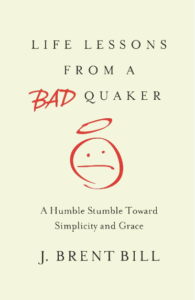Life Lessons from a Bad Quaker: A Humble Stumble Toward Simplicity and Grace
Reviewed by Diane Reynolds
August 1, 2016
 By J. Brent Bill. Abingdon Press, 2015. 208 pages. $16.99/paperback; $9.99/eBook.
By J. Brent Bill. Abingdon Press, 2015. 208 pages. $16.99/paperback; $9.99/eBook.
Buy from Quakerbooks
In Life Lessons from a Bad Quaker, Brent Bill takes the reader through the basics of Quaker living, including stillness, peacemaking, simplicity, community, and integrity. He then moves to earthcare and having a sense of humor. His method is to weave together personal anecdotes with stories of other Quakers, some well known and some not. Chapters are interspersed with sayings from famous personages, including Jesus, and with pauses for reflective queries called “Quick Quaker Questions.” The book, written in simple language, is easy to read with frequent section breaks and pull quotes.
As a longtime Quaker, I expected to have to put myself into the skin of a new Quaker, a seeker, or someone curious to know more about Quakers in order to fully appreciate the book. I was surprised, therefore, at how deeply the book touched me.
For those who like homespun humor, Bill has a sure rhythm, keeping the pace as he tells comically self-deprecating tales and pithy, funny stories about Quakers from the past. But this book is more than just a humorous romp through Quakerdom. I found myself going back, skipping the jokes and simply stringing together the sweet, serious prose with its simple advice about living in the Spirit.
On the serious side, I especially appreciated the quotes Bill chose, and the way he examines the complexities of Quaker practices and testimonies. Experienced Friends can sometimes brush over these superficially, especially when we know them so well.
In the section on silence, for instance, Bill encourages people to take five minutes a day for silent worship, then distinguishes between choosing the best time and the most convenient time. I appreciated this parsing and found myself wondering if I pick the moment when listening for the inner voice is most fruitful for spiritual growth or when I can most conveniently fit it into my to-do list. I also resonated with the idea that silent worship is most valuable when it goes on in the midst of the world’s activities. Bill calls this practice of staying connected to the divine source through life’s hubbub “listening through life,” and mentions pastor Doug Pagitt’s advice to his programmed, non-Quaker congregation that they keep their cell phones on during services in order to learn to worship in the midst of the world making its demands.
Bill notices how complicated simplicity can be. Likewise, the not unknown reminder to focus our peacemaking on those closest to us, such as other Quakers, is apt. I found it helpful to be reminded of the ways we all hurt each other without meaning to. Keeping a sense of humor—laughing, being able to joke—is one way to deal with this. Humor is not a traditional Quaker concern. As we know, Quakers are typically associated with soberness. Yet, given the extent to which modern Quakers can take themselves too seriously, the admonishment to relax and have fun is one to heed.
Bill approaches his point from different angles, but always emphasizes that—“bad” Quakers as we all might be—what matters is how we take our Quaker formation out into the world. As Isaac Penington, quoted in Life Lessons, puts it: “Our life is love, and peace, and tenderness; and bearing one with another, and forgiving one another, and not laying accusations one against another; but praying one for another, and helping one another up with a tender hand.”
Life Lessons offers help “with a tender hand” for seasoned Friends as well as those new to Quakerism.



Comments on Friendsjournal.org may be used in the Forum of the print magazine and may be edited for length and clarity.